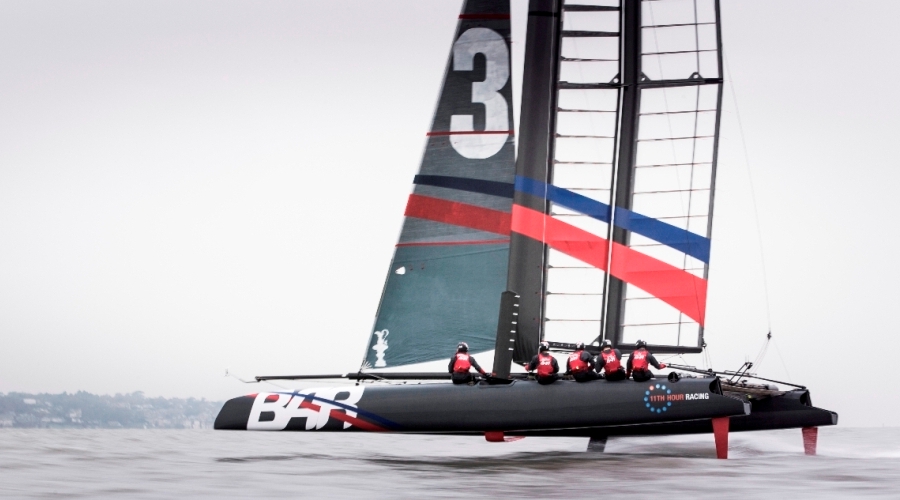Institution news
Picture by www.lloydimages.com.
Nearly 300 Institution members and their guests gathered at the University of Southampton to hear Andy Claughton, Technical Director for Ben Ainslie Racing (BAR), deliver an insight into the technical elements facing the British challenger of the 35th America’s Cup, taking place in Bermuda in 2017.
The talk, entitled ‘Engineering for Take-off’, was held on 20 November in Southampton, and was organised by the Southampton Area Committee, part of the Wessex Region, reflecting the widespread interest in the challenge among mechanical engineers, many of whom are competitive sailors themselves.
Formerly Enterprise Director of Southampton University’s Wolfson Unit, in his new role, Andy Claughton coordinates a team of designers and engineers as they plan, build and test the prototype and final boats. Andy said: “The America’s Cup is a competition where you cannot afford to have an unreliable boat. If the sailors don’t have confidence [in the boat] they won’t be able to go for a manoeuvre that could win the race. All the time we’re trying to build a commonality of knowledge about the art of the possible between the sailing team and the design team.”
In 2017, all competitors will race in new AC62 catamarans, powered by highly efficient wingsails and designed to fly above the water on foils at speeds near 50mph. The 62-foot hydrofoiling catamarans demand an entirely new set of technologies, many never put to work on the water before. The rules preclude any automation or feedback mechanisms, so the man-machine interface and stability will be critical, not only to safety but ultimately to giving the crew race-winning control.
Alex Dickinson CEng MIMechE, Southampton Area Chairman, and University of Southampton Academic Liaison, said that it quickly became clear that Andy’s lecture would be extremely popular, and had to move the event to a venue with double the usual capacity.
He commented: “As a committee we are keen that our lectures reflect the inspiring ways in which engineering is being applied, and how the UK is doing things differently from other countries, to inspire our next generation of young engineers.
“Bloodhound SSC, for example, is a perfect illustration of this. We had previously held a very successful lecture on the America’s Cup theme from innovative composite structures company, Gurit, and were thrilled that Andy could follow this up and speak to us on behalf of the team putting in our next challenge. We were delighted to offer people of all sectors in engineering, including a great number of students, a further opportunity to see how their studies can be applied in such a real and dynamic endeavour.”

Picture by www.lloydimages.com.
Peter Hebard BSc CEng FIMechE originally proposed this lecture, helped organise the event and introduced the speaker. He outlined how he feels that the diversity of engineering experience, reflected in the assembled audience as well as through the Institution, could be the key to winning the challenge.
He said: “Professional engineers – mechanical, aerospace, marine and others – working as a community, can give BAR the edge. We recognise that complications that the BAR design team will face may not traditionally have been addressed in hydrodynamics or naval design, but solutions may well have been developed in another field – in fighter aircraft or on a race track.”
Peter said that Andy’s lecture marks a ‘call to action’ for members of the Institution. Peter commented: “UK Engineers have been key to many recent British sporting achievements, from the Olympics to Formula One. The IMechE’s aim is to connect Andy and his team to the best expertise that our members can offer and secure the support and resources from UK corporates needed to optimise every aspect of the design.”
“The broad spectrum of what mechanical engineers do means that there will be a wealth of knowledge and solutions within our Institution. Through the expertise in our networks, I hope that we can support this immense and thrilling challenge.”
If you or your company may be able to support the challenge through knowledge-sharing, cutting edge technology and product development, please contact the Institution’s Southampton Regional Committee.